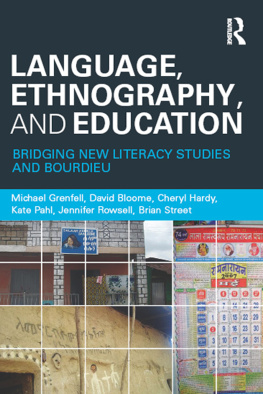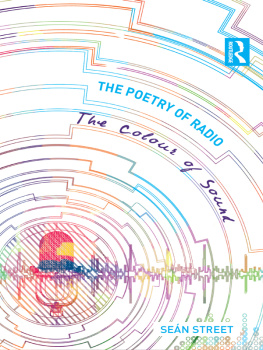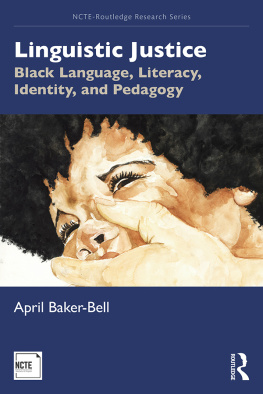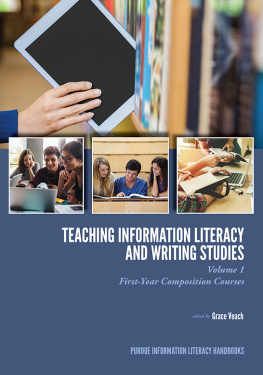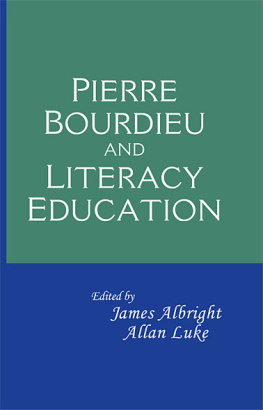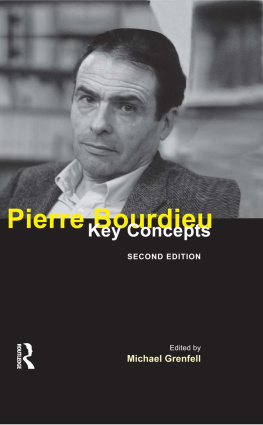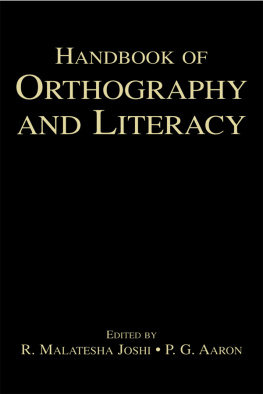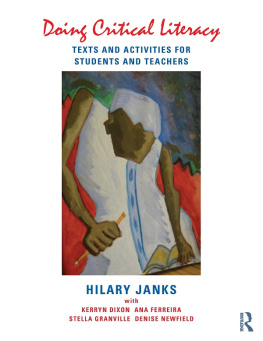LANGUAGE, ETHNOGRAPHY,
AND EDUCATION
This frontline volume contributes to the social study of education in general and literacy in particular by bringing together in a new way the traditions of language, ethnography, and education. Integrating New Literacy Studies and Bourdieusian sociology with ethnographic approaches to the study of classroom practice, it offers an original and useful reference point for scholars and students of education, language, and literacy wishing to incorporate Bourdieu's ideas into their work.
More than just a set of stand-alone chapters around social perspectives on language interactions in classrooms, this book develops and unfolds dialogically across three sections:
Bridging New Literacy Studies and Bourdieu Principles
Language, Ethnography, and Education Practical Studies
Working at the Intersections In Theory and Practice
The authors posit classroom language ethnography as a genuinely new perspective with rich and developed traditions behind it, but distinct from conventional approaches to literacy and education an approach that bridges those traditions to yield fresh insights on literacy in all its manifestations, thereby providing a pathway to more robust research on language in education.
Michael Grenfell is Chair of Education (1905) in the School of Education, Trinity College, University of Dublin, Ireland.
David Bloome is Professor of Education in the School of Teaching and Learning at the Ohio State University, USA.
Cheryl Hardy is Principal Lecturer and Head of Work-related Learning at Liverpool John Moores University, UK.
Kate Pahl is Senior Lecturer in Education at the Department of Educational Studies, University of Sheffield, UK.
Jennifer Rowsell is Associate Professor of Literacy Education and a Canada Research Chair in Multiliteracies at Brock University, Canada.
Brian Street is Professor of Language in Education at King's College, London University, UK, and Visiting Professor of Education in the Graduate School of Education, University of Pennsylvania, USA.
LANGUAGE,
ETHNOGRAPHY,
AND EDUCATION
Bridging New Literacy Studies
and Bourdieu
Michael Grenfell, David Bloome, Cheryl Hardy,
Kate Pahl, Jennifer Rowsell, and Brian Street

First published 2012
by Routledge
711 Third Avenue, New York, NY 10017
Simultaneously published in the UK
by Routledge
2 Park Square, Milton Park, Abingdon, Oxon OX14 4RN
Routledge is an imprint of the Taylor & Francis Group, an informa business
2012 Taylor & Francis
The right of the Michael Grenfell, David Bloome, Kate Pahl, Jennifer Rowsell, Brian Street, and Cheryl Hardy to be identified as the authors of this work has been asserted in accordance with sections 77 and 78 of the Copyright, Designs and Patents Act 1988.
All rights reserved. No part of this book may be reprinted or reproduced or utilised in any form or by any electronic, mechanical, or other means, now known or hereafter invented, including photocopying and recording, or in any information storage or retrieval system, without permission in writing from the publishers.
Trademark notice: Product or corporate names may be trademarks or registered trademarks, and are used only for identification and explanation without intent to infringe.
Library of Congress Cataloging in Publication Data
Language, ethnography, and education : bridging new literacy studies and Bourdieu / Michael Grenfell ... [et al.].
p. cm.
1. LiteracySocial aspects. 2. LiteracyResearch. 3. Language and
education. 4. Educational sociology. 5. Ethnology. 6. Bourdieu,
Pierre, 19302002.
I. Grenfell, Michael, 1953
LC149.L235 2011 2011003273
379.24dc22
ISBN: 978-0-415-87248-5 (hbk)
ISBN: 978-0-415-87249-2 (pbk)
ISBN: 978-0-203-83605-7 (ebk)
Typeset in Bembo
by HWA Text and Data Management, London
Printed and bound in the United States of America on acid-free paper
by Walsworth Publishing Company, Marceline, MO.
1
INTRODUCTION
MICHAEL GRENFELL
No one could deny the interest and attention that language in education has attracted in recent decades. That interest itself arose from a century wide preoccupation with language and the part it played in human systems of interaction and communication. But, the study of language in education has its own history and traditions. This history can, of course, be traced back for centuries well before the last one and would involve the philosophy of human thought. However, language in education as we currently know it has, however, only come about in the last fifty years or so, and is intimately bound up with the growth and development of research and scholarship over this period.
For the first half of the twentieth century, research in language and education was mostly characterised by a model which mirrored that of the physical sciences. Here, a psychological paradigm was dominant, and with it, a focus on psychometric testing, statistics, and a broadly positivistic approach to scientific enquiry. For language, structuralism was still influential, a tradition which looked for the meaning of language processes in the structure and form of language itself. The behaviourist perspectives emerging from the 1930s did nothing to attenuate the centrality of linguistic form as the established object of academic research. Education took a similar approach, and was preoccupied with intelligence tests and empirical methods of analysis to measure the psychological processes of learning. Theory formation itself was developed and tested in ways analogous to the normative sciences in search of the rules of human behaviour. However, all of that changed from the mid-century point.
Linguistics, the science of language, was first rocked by the Chomskyan revolution, with its claim that language was an innate characteristic of the human brain, of a Language Acquisition Device (LAD), and consisting of deep structural properties which generated speech. Differences between languages individual tongues were simply the surface phenomena of these structures. This discovery subsequently founded an entire new paradigm, one which studied the universal grammar apparent in all languages. The core of such an approach was, however, no less analytical, with a focus on the predictable transformations of grammar in their universal forms. However, another perspective entirely was about to explode onto the scene, one which took an altogether different track.
In retrospect, it is easy to see how the 1960s represented an opening out of human relations. The age of communications was born and, with it, easier access to other peoples and cultures, and a growing curiosity to raise horizons beyond conventional boundaries. These boundaries need to be understood as social, cultural, and psychological. In educational research, the new epistemological zeitgeist turned its back on the psychometric methods of the past, and instead adopted more socalled qualitative, approaches. Disciplines such as philosophy, sociology and history as applied to education challenged the established dominance of psychology. All of these fields encouraged more naturalistic approaches to the study of education and, increasingly, researchers became interested in the culture of classrooms and the socio-historic factors impinging on the processes of teaching and learning. The discipline of language in education itself was born as a new focus within such a changing perspective: the speech event became a unit of analysis, as did the study of the rules of use without which the rules of grammar would be useless (Hymes: 1972/67).

